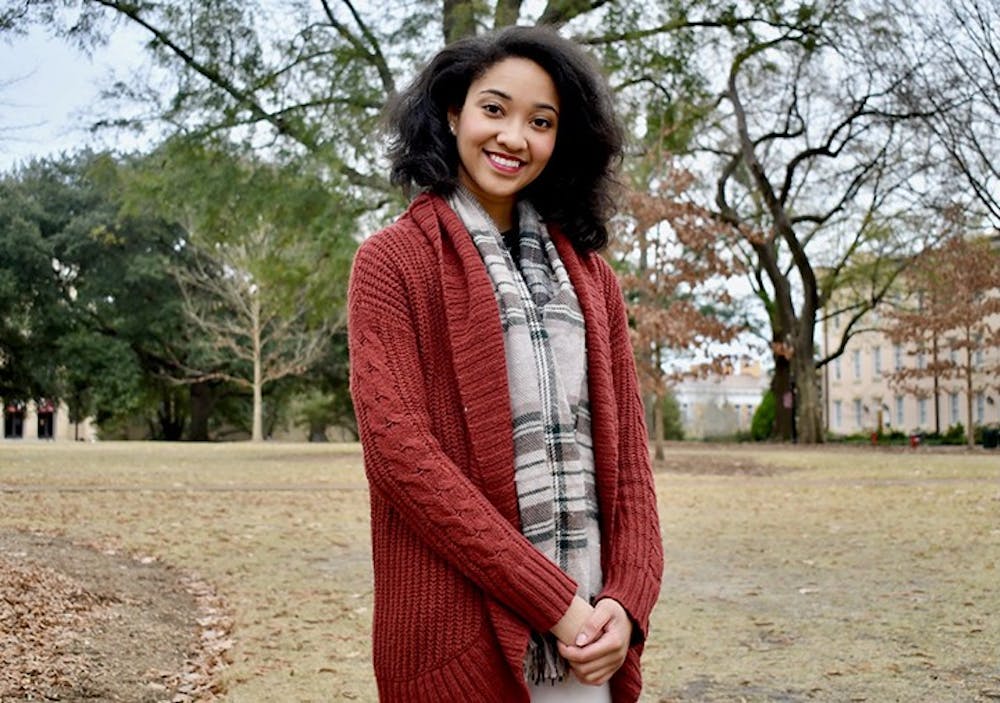Antonia Adams, a USC honors college and third-year business economics student, has always been a “genius of hard work,” according to her childhood best friend Delshawn Anderson. She graduated valedictorian of her high school class before attending Piedmont Technical College in Greenwood, South Carolina.
But she wasn’t alone in her educational pursuits. Anderson describes Adams’ parents as the “guardians of her education.”
“When we were in high school, she’d actually have her parents drive her to school so that she can continue studying,” Anderson said. “She got her work ethic from them.”
But everything changed for Adams in September of 2016, when her mother, Elnora Daniel Adams, was diagnosed with stage four cancer. She passed away on March 5, 2017.
“I remember the words that she said to me as she was laying on her deathbed," Adams said. "She said, ‘You will go back to school. You’re going to keep living your life. And I love you, and I’m always going to love you.’”
On March 11, 2017, Adams buried her mother. The next day her father, James Daniel Adams, was hospitalized. Two days later, the doctors found a tumor.

“I sat in the hospital, day and night, just praying for a miracle,” Adams said.
Not long after that, her father was put on life support. Doctors declared him brain dead just two weeks later. Adams had to make the decision to take her father off of life support, and he passed away on May 26.
The experience was “beyond earth-shattering,” Adams said.
“During that time, I was appointed as the personal representative and power of attorney for both of my parents, and as a result, at 20 years old I was responsible for managing their entire estate, taking care of them when they were sick, handling their sick leave and just dealing with all the paperwork that comes with sickness and death and illness and money,” Adams said.
Adams said she ended up feeling really frustrated with what she was having to go through.
“I think what we have as a society is not able to protect families like me," Adams said. "We don’t have paperwork that’s easy to understand. We don’t have family medical leave that allows a family to keep their insurance unless they can afford it.”
Early on in her mother's cancer diagnosis, Adams’ family had to pay $5,000 for chemotherapy. Her parents became too sick to work, but the medical bills kept coming. Adams said her family went from middle-class to low-income.
“I think before, I always believed that if a person just works hard they can get what they want. I never had that understanding of tragedy and grief and poverty and all those other things that make it so much harder for people to get where they want to be,” Adams said.
After her parents' death, Adams took a year to deal with both her grief and her new responsibilities managing her parents' estate. Then, she went back to Piedmont Tech.
Adams remembers crying on her way to enroll in classes and worrying she wasn't ready. But it was her desire to use her own experience to help others that got her through the door.
"She's very interested in justice for all," Adams' aunt, Linda Eaddy, said. "She is so willing to help others, and share with others."
Adams went on to become student body president and vice president of diversity and action at Piedmont Tech.
"And slowly but surely, I watched as I rebuilt my life, step by step," Adams said.
After presenting at the regional Student Leadership and Diversity Conference on the Columbia campus, Adams knew she wanted to attend USC. She applied and was accepted into the Darla Moore School of Business and the South Carolina Honors College for the fall 2020 semester.
After she graduates from USC with a degree in economics, Adams said she hopes to continue her education at Georgetown Law School where she will pursue a Juris Doctorate degree in public policy law. She plans to use that law degree to run for a government position so she can "shape policies that are going to help alleviate poverty and help people overcome their circumstances."
“I just really wanted to do something to honor my parents and to really make that experience worthwhile," Adams said. "And I feel like I went through all of that so that I can better understand what it feels like to be hopeless, what it feels like to navigate a system that’s not helpful for people, and to really be the catalyst for change that I want to see in society.”
When she’s feeling down, Adams has a mantra that keeps her going: “Life is hard, we have to deal with it.”
“When I say deal with it, I say that it is better to not paint yourself as a victim, but to paint yourself as a victor,” Adams said.
Chloe Barlow contributed to the reporting of this article.
Correction (Jan. 26, 2021, at 12:56 a.m.): A previous version of this article incorrectly stated when Elnora Daniel Adams was diagnosed with cancer.

